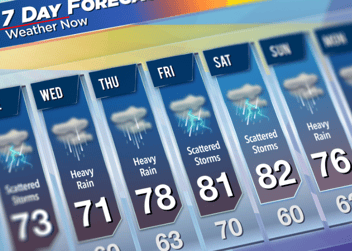Construction projects are time-sensitive undertakings that are often reliant on good weather conditions. However, with global warming, the weather is notoriously unpredictable. It is increasingly difficult to make ten-day weather forecasts – which is a problem for the construction industry.
According to research at Stanford, when the atmosphere warms by a few degrees Celsius, forecasts for reliable temperature, wind and rainfall become less reliable by about a day.
That's why it's essential to incorporate weather risk assessments into your construction planning process.

What Are Weather Risk Assessments?
Weather risk assessments are analyses of the potential risks that severe weather events could pose to your project.
It is a process by which a construction company can identify the risks associated with working in severe weather conditions and develop plans to mitigate those risks. The assessment should consider the risks posed by the specific weather hazards themselves and the risks associated with implementing safety protocols (e.g., shutting down work, evacuating sites, etc.) in response to those hazards.
Potential Risks Associated with Extreme Weather Events
Here are just a few of the potential risks that can be associated with severe weather.
Schedule Delays
If wet weather causes delays in the delivery of materials or the start of work, it can quickly throw off your entire construction schedule. This can lead to costly delays and lost productivity.
Site Access Issues
Bad weather can make accessing your construction site difficult or even impossible. This can further delay the start of work and add to the cost of getting materials to the site.
Safety Hazards
Wet conditions from flash floods can create safety hazards for both workers and passers-by. From slips and falls to traffic accidents, there are a variety of potential risks that need to be considered.
Traffic Disruption
Deliveries of materials and equipment are essential for continuing progress on site, poor weather can cause travel disruption, sometimes slowing deliveries or preventing them entirely. The same goes for people working at site, if the roads are congested this can eat into time where they could be clearing the site after a storm or snow event.
Benefits of Weather Risk Assessments in Construction
The two primary benefits of conducting a weather risk assessment are as follows.
Mitigate Risks
Incorporating weather risk assessments into your construction planning process is the best way to safeguard against the potential risks we have listed above. By taking the time to identify and understand the risks associated with bad weather, you can ensure that your construction project can withstand anything Mother Nature throws your way.
You can also make contingency plans for how to deal with weather delays or safety hazards. By being prepared, you can minimise the impact of bad weather on your construction project.
Solve Project Disputes
Construction contracts often come with clauses that incorporate penalties for missed deadlines. However, if you can prove that the impact of the weather was extreme and outside the normal bounds of weather expected at that time of year then you will be able to claim and extend the programme, or in some cases recoup the cost as well.
If weather delays cause disputes with your construction partners, accurate weather risk assessments can provide the documentation you need to support your position.
How to Conduct Weather Risk Assessments
A few different approaches can be taken when conducting weather risk assessments. The most important thing is to use an approach that makes sense for your project. Here are a few standard methods.
Reviewing Historical Data
One approach is to review historical data for your area to get an idea of what weather conditions you can expect during the construction period. This data can be sourced from local meteorological agencies or private companies specialising in weather data collection and analysis.
Utilising Predictive Models
Another option is to utilise predictive climate models that generate forecasts based on current conditions and historical data. These models can give you a pretty good idea of what weather conditions you can expect in the coming days, weeks, or months.
Consulting Local Experts
A third approach is to consult with local experts who have experience dealing with the local climate and its effects on construction projects. These experts might include meteorologists, climatologists, or even construction professionals who have worked in your area before.
The frequency with which you should conduct weather risk assessments will depend on many factors, including the type of project being undertaken, the location of the project site and the weather conditions that are common in that area. In general, however, most experts recommend that companies conduct assessments yearly — preferably during peak construction season.
EHAB Weather Risk Management Platform
Weather risk assessments are an essential part of any construction planning process. By taking the time to identify and understand the risks associated with bad weather, construction companies can safeguard against costly delays, lost productivity, and other potential problems.
In this post, we have enumerated several approaches that can be taken when conducting weather risk assessments. However, the EHAB risk management platform is the most comprehensive weather risk assessment tool available today.
The EHAB platform empowers construction managers with hyper-local climate-adjusted datasets, powered by machine learning technology and replete with modern planning features. For more information on how EHAB can help you mitigate weather risks on your construction project, book a free 30-minute demo.



